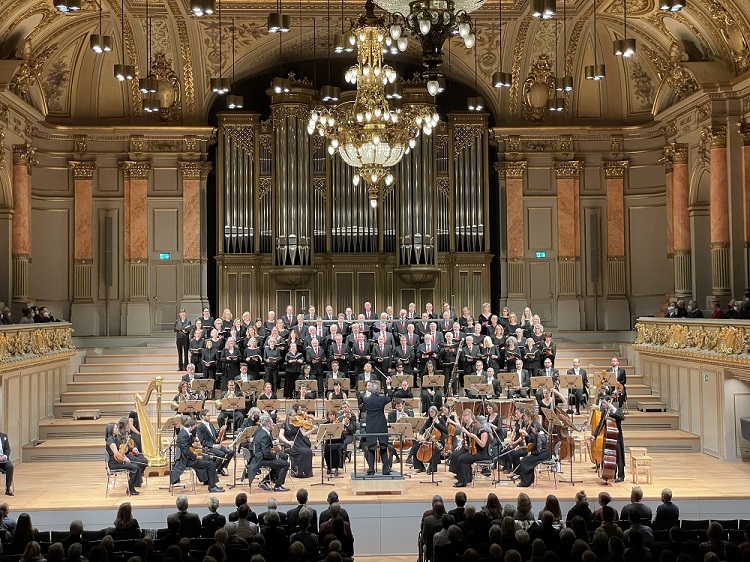 Switzerland Brahms: Susanne Langbein (soprano), Detlef Roth (baritone), Der Gemischte Chor Zürich, Capriccio Barockorchester / Joachim Krause (conductor). Tonhalle Zürich, 14.10.2021. (GA)
Switzerland Brahms: Susanne Langbein (soprano), Detlef Roth (baritone), Der Gemischte Chor Zürich, Capriccio Barockorchester / Joachim Krause (conductor). Tonhalle Zürich, 14.10.2021. (GA)

Brahms – Ein deutsches Requiem, Op.45
Ein deutsches Requiem is not your garden-variety mass for the dead. It is not liturgical and does not use the customary Latin text. Its focus is not on the departed soul, for whom peace is requested in the hereafter. Although Brahms’s impetus did come from the death of his close friend and benefactor Robert Schumann, the project languished for almost a decade until his mother’s death provided fresh motivation, by which time Brahms’s concept had ripened into a meditation on the transience of life in general, and on the human condition. It is not a mass for anyone; instead, it speaks to all men: to the living.
But the Requiem is not a cry of despair: existential angst only became a ‘thing’ much later. Rather, it seeks the aid of a higher power to make us understand our limitations, to make us know that there is something limitless and wonderful beyond our circumscribed existence: and this despite the fact that Brahms was reputedly a thoroughgoing agnostic. Was Ein deutsches Requiem a last-ditch effort to cultivate faith? An attempt to transcend reality through musical sorcery? Or the sober realization that, if this is the best we’ve got – well then, I’ll have to run with it?
As text, Brahms selected biblical passages ranging from sombrely realistic to wildly triumphant and combined them with the late Romantic orchestra and choir, instruments of unequalled musical expression and power. Ein deutsches Requiem uses a wide range of conventional rhythmic and harmonic tropes. A dead march, for example, presages the demise of all earthly things (‘Denn alles Fleisch, es ist wie Gras…’/‘Behold, all flesh is as the grass…’). Lighthearted tripping dances in a triple metre express confident expectation of the rewards to come (‘So seid nun geduldig…’/‘Now, therefore, be patient…’), or the joys of paradise attained (‘Wie lieblich sind deine Wohnungen…’/’How lovely is Thy dwelling place…’). Fugues, gem-like in their organised perfection, portray heavenly order (‘Der Gerechten Seelen sind in Gottes Hand…’/‘But the righteous souls are in the hand of God…’), or represent the everlasting praise directed at the Throne of God (‘Herr, Du bist würdig…’/‘Worthy art Thou…’). Recitatives, both in the choir and solo, efficiently advance the narrative.
Yet Brahms is most original, musically, in the two predominantly piano bookend movements: Movement I with its promise of solace, that gathers us into the meditation of the Requiem, and Movement VI, that releases us, purged and wiser, back into the world.
Thus Brahms, the putative agnostic, produced a genuinely moving, religion-informed work that has provided solace and given reflective pause to troubled audiences for over a century and a half.
And did the painted cupola of the newly restored Tonhalle, the columns and pilasters, the garlands and gilt, reverberate to the joyous hosannas and soft-breathed blessings of this masterpiece? Well, yes. The Capriccio Barockorchester wove their fugues well, were grand at evoking the ewige Freuden (joy everlasting) but might have allowed themselves fewer ragged entrances. Their voices might have been more unified. On the podium, Joachim Krause’s choreography was elegant and convincing; his charges, however, did not perfectly emulate his verve and precision. The choir was wonderful at and above mezzo forte. Again, the fugues: well done! The piano passages, those in Movements I & VII above all, could have been more intense: in this work, piano means espressivo, and a consonant sung at piano is a consonant unsung.
Detlef Roth’s solo baritone was wholly adequate, though I might have expected a singer with as much Wagner experience to have delivered a more prodigious ‘last trumpet’. The surprise of the evening was Susanne Langbein. Key to her solo (Movement VI) is a voice that consoles: a voice not cloying even in the slightest, or merely sweet, but one capable of comforting and assuaging all the misery of the world. She does not have this quality now, though she may be one of the few who acquire it with age. What she does have is a powerful voice, a voice of substance; a voice that is quite simply remarkable. And for me, she walked away with the evening.
Griff Anderson
